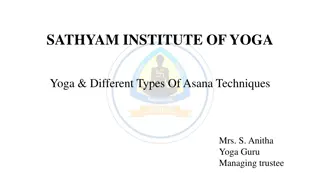The Importance of Yoga in Modern Life
Yoga, a holistic discipline originated in ancient India, encompasses physical postures, breath control, meditation, and ethical principles to promote physical, mental, and spiritual well-being. It benefits physical health by improving flexibility, muscle strength, posture, and balance, while also enhancing mental health by reducing stress, improving focus, and regulating mood. Yoga fosters social connections, aids in the workplace for stress reduction and productivity, and can be integrated into education for student well-being.
Download Presentation

Please find below an Image/Link to download the presentation.
The content on the website is provided AS IS for your information and personal use only. It may not be sold, licensed, or shared on other websites without obtaining consent from the author.If you encounter any issues during the download, it is possible that the publisher has removed the file from their server.
You are allowed to download the files provided on this website for personal or commercial use, subject to the condition that they are used lawfully. All files are the property of their respective owners.
The content on the website is provided AS IS for your information and personal use only. It may not be sold, licensed, or shared on other websites without obtaining consent from the author.
E N D
Presentation Transcript
The Importance of Yoga in Modern Life SUCHHANDA BERA BAJKUL MILANI MAHAVIDYALAYA DEPARTMENT OF NSS 06.02.2019
Introduction Yoga is a holistic discipline that originated in ancient India, encompassing physical postures, breath control, meditation, and ethical principles. It aims to promote physical, mental, and spiritual well-being, fostering harmony between the mind, body, and spirit.
Benefits of Yoga for Physical Health Yoga offers numerous physical health benefits, such as improved flexibility, muscle strength, posture, and balance. It can also enhance cardiovascular health, increase lung capacity, and promote better digestion. Regular practice can help alleviate chronic pain, reduce the risk of injuries, and boost the immune system. Additionally, yoga's relaxation techniques may help lower blood pressure and manage stress, contributing to an overall healthier lifestyle.
Benefits of Yoga for Mental Health Yoga has several mental health benefits, including reducing stress and anxiety levels through relaxation techniques and deep breathing. It can improve focus, concentration, and cognitive function, enhancing mental clarity. Regular practice of yoga has been linked to better sleep quality, mood regulation, and a sense of overall well-being. It may also help manage symptoms of depression, promote self-awareness, and provide tools for coping with life's challenges
Benefits of Yoga for Social Connection Yoga can foster social connection by creating a supportive community, promoting mindfulness and empathy, and providing opportunities for shared experiences that can enhance relationships and communication skills.
Yoga in the Workplace Introducing yoga in the workplace can lead to reduced stress, improved focus, increased productivity, enhanced employee well-being, and better team collaboration. It can also promote a positive work environment and help employees manage their physical and mental health.
Yoga and Mindfulness in Education Integrating yoga and mindfulness into education can have various benefits, such as promoting focus, reducing stress, and enhancing overall well-being for students. These practices can help students manage emotions, improve concentration, and create a positive learning environment.
Yoga for Healthy Aging Yoga can be beneficial for healthy aging by improving flexibility, balance, and strength. It may also help reduce stress, improve mental clarity, and enhance overall well-being as individuals age. Consult with a qualified instructor to create a personalized yoga routine that suits your specific needs and goals.
Conclusion Yoga holds significant importance in modern life due to its multifaceted benefits. It helps manage stress, improves physical flexibility, promotes mental clarity, enhances mindfulness, and cultivates a sense of overall well-being. In our fast-paced world, integrating yoga into daily routines can contribute to a healthier lifestyle, both physically and mentally.


























